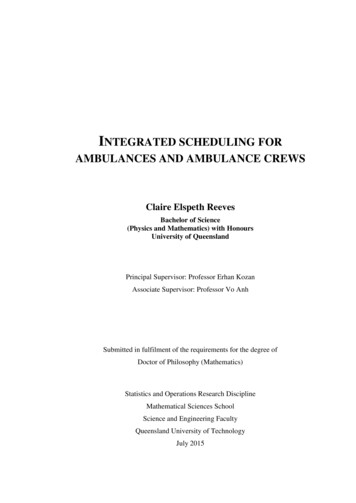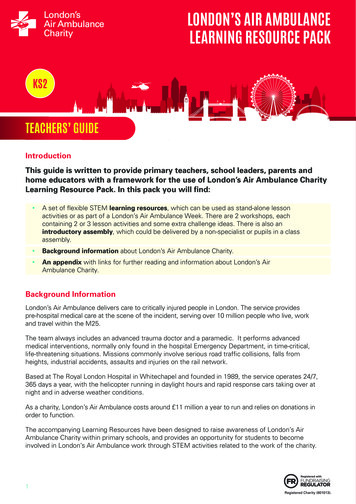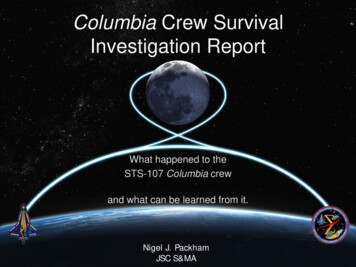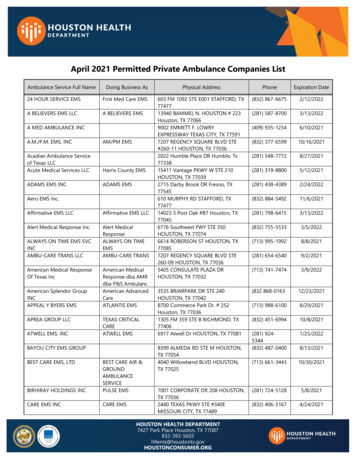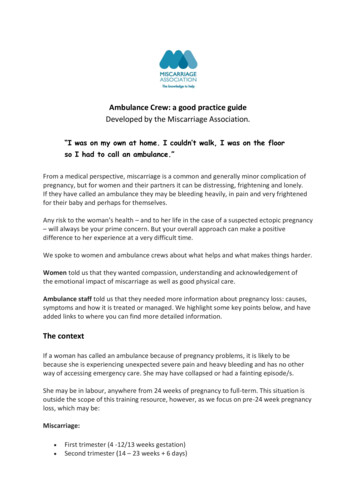
Transcription
Ambulance Crew: a good practice guideDeveloped by the Miscarriage Association.“I was on my own at home. I couldn’t walk, I was on the floorso I had to call an ambulance.”From a medical perspective, miscarriage is a common and generally minor complication ofpregnancy, but for women and their partners it can be distressing, frightening and lonely.If they have called an ambulance they may be bleeding heavily, in pain and very frightenedfor their baby and perhaps for themselves.Any risk to the woman’s health – and to her life in the case of a suspected ectopic pregnancy– will always be your prime concern. But your overall approach can make a positivedifference to her experience at a very difficult time.We spoke to women and ambulance crews about what helps and what makes things harder.Women told us that they wanted compassion, understanding and acknowledgement ofthe emotional impact of miscarriage as well as good physical care.Ambulance staff told us that they needed more information about pregnancy loss: causes,symptoms and how it is treated or managed. We highlight some key points below, and haveadded links to where you can find more detailed information.The contextIf a woman has called an ambulance because of pregnancy problems, it is likely to bebecause she is experiencing unexpected severe pain and heavy bleeding and has no otherway of accessing emergency care. She may have collapsed or had a fainting episode/s.She may be in labour, anywhere from 24 weeks of pregnancy to full-term. This situation isoutside the scope of this training resource, however, as we focus on pre-24 week pregnancyloss, which may be:Miscarriage: First trimester (4 -12/13 weeks gestation)Second trimester (14 – 23 weeks 6 days)
Ectopic pregnancyMolar pregnancy – usually diagnosed only after a miscarriageIn miscarriage Pain and/or bleeding may have started completely unexpectedly and increased rapidly;or she might have had some signs and symptoms earlier.She may already have been diagnosed with a ‘missed’, ‘silent’ or incomplete miscarriageand be waiting for medical or surgical management of the process.She may have opted for expectant/natural management of her miscarriage (lettingnature take its course) or she might have had medical management, but the pain andbleeding are far more than she expected.Even in the first trimester, pain can be very similar to the contractions of labour.In ectopic pregnancy Acute abdominal pain, often to one side, is the primary symptom, but there may also beshoulder-tip pain. Bleeding is usually minimal.Symptoms may be confused with appendicitis, especially if the woman does not know ifshe is pregnant.Acute abdominal pain that resolves may indicate tubal rupture and internal bleeding.If a woman of child-bearing age presents with acute abdominal pain,ectopic pregnancy should always be considered, even if she does notknow she is pregnant.Consider how she might be feeling – be sensitive and compassionate She may be hoping that something can be done to save her pregnancy. She may feel asthough her baby is dying while she is in the ambulance.For her this situation is an emergency. It can help to reassure her that you are doingeverything you can to get her to hospital as quickly as possible.Don’t give her false hope or reassurance. Even though it may be intended to comfort, itisn’t appropriate and may cause further distress as things progress.Even if you mean to reduce her distress, try not to make light of her feelings or try tocheer her up.Say (and show) you are sorry for what she’s going through, if it’s appropriate.“It’s a lot different bleeding because you’ve had an accidentand bleeding because you are losing your baby.”
Think about your language Most (though not all) women want you to refer to the pregnancy as a baby, and to themiscarriage as the loss of their baby. If you’re not sure what language to use, ask herwhat she’d prefer.Terms like ‘spontaneous abortion’ or ‘products of conception’ are upsetting to mostwomen.Try not to minimise the loss. Referring to it as a ‘just a heavy period’, ‘back luck’ or saying‘you’re young, you can try again’ can actually increase distress.Try to avoid using medical terminology and/or explain things in lay language.Deal sensitively with pregnancy tissue and remainsDuring the process of miscarriage, women may pass blood clots, pregnancy tissue or arecognisable fetus or baby. This may happen at home before you arrive or during thejourney to hospital. For many, what happens to these remains is very important. Even ifthey appear just to be blood and tissue, they are all that remains of their baby. Try to dealwith them sensitively. If you see pregnancy tissue or a recognisable fetus in the house, including in the toiletbowl, ask if she would like this collected. Do not automatically flush away any remains,but be ready to if she prefers this.Place any pregnancy tissue or recognisable fetus that you collect in a clean, leak-proofcontainer. While this might be something available in the house (such as a plastic tuband lid), it might be better and more sensitive to use something from the ambulance,such as:o a bowl or kidney dish from the maternity pack; oro an alternative disposable containero an opaque plastic container with a lidWhere there is an identifiable fetus or baby, consider lining the container with gauze.This both softens the appearance of the container and is protective of fragile tissue.Consider asking the woman if she wants to hold the container during the journey.Ensure the remains are labelled and go with the woman into hospital.“If I had lost anything in the house or en route, I would likeit compassionately taken to hospital with us.”Give clear information about what is happening now Be prepared to respond to questions. Here are some example questions and answers.Is my baby OK? ‘I’m afraid we won’t know until we get you seen at the hospital/until you have a scan’‘I’m afraid it doesn’t look that way’
Can you stop the bleeding? ‘I’m afraid we can’t, but we’ll look after you as well as we can’
Is there supposed to be this much pain? Is this normal? ‘Unfortunately this kind of pain does often happen during the process of miscarriage. Itcan be like a mini labour ’If you can’t give clear answers, think about who might be able to, in the hospital orelsewhere. If appropriate, pass on details of the Miscarriage Association as a source ofsupport. (We can provide you with a supply of contact cards.) and about next steps Tell her that you’ll be transferring her to A&E (unless you have a direct link to anotherdepartment).Explain that once there, she may have to wait some time to be seen.Reassure her that you will make sure that she is covered up during transfer and whenyou leave her, so she is not embarrassed by obvious vaginal bleeding.Got more time?These additional resources might be helpful:The ‘Care Opinion’ website (careopinion.org.uk). Search for miscarriage, ectopic pregnancyor molar pregnancy – and/or for your own Ambulance Trust – to read patient perspectiveson their care.“Additional information for ambulance crews”: a more detailed paper on miscarriage,ectopic and molar pregnancy facts and feelings.Take a look at all the films in this series: The ambulance call-outIn A&EThe GP surgeryAt the booking-in scanTalking about the management of miscarriageTalking about the sensitive disposal of pregnancy remainsYou’ll find links to each on the Resources and References page of our website.Consider your needs tooWorking in the ambulance service can he hugely rewarding but there’s no denying that itcan also be stressful, especially when you are treating people with life-threatening illness orinjuries.The extra factor in dealing with miscarriage patients is that you have an additional invisiblepatient, one whose life you are very unlikely to be able to save or prolong. But that may not
be the woman’s perspective. Her levels of anxiety and distress may be very high and youmight encounter some difficult emotions not only from her but also from anyoneaccompanying her.We hope some of the following suggestions will help – for miscarriage patients and perhapsothers too.Identify the difficulties“Not being able to answer their questions is very difficult andmakes me feel like I’m inadequate in my job, when in fact I’vejust not had adequate training.”These may include: particular reactions that you find difficult to deal with:o desperation for you to ‘do something’, solve the problemo tearso anger and blame – especially if directed at you particular situations that are difficult or distressing:o a patient or loss that you identify with due to your own experienceo your own views and values on the significance of some cases, especiallycompared with other patients you see the context:o limits to the care you can provideo limits to the information you can provide: about her condition and about nextstepso lack of follow-up – never knowing the outcome of your careIdentify your sources of support Your most likely source of support will be your peers: in your hospital/Trust individually, informally in staff meetings, training sessions and/or clinical supervision peers from other hospitals individually, informally at conferences and wider training eventsYou might also consider: your partner, if you have one, or a trusted friendtalking to us at the Miscarriage Association in strict confidence and make use of them
It’s one thing to know where you can find support. It’s another thing to do something aboutit. It’s worth considering that your peers may have similar concerns and might also benefitfrom talking about these issues together.And finallyMiscarriage is never easy – for the woman or couple involved or for the staff who are taskedwith looking after them. You may not get it right for everyone, but patients will alwaysremember your care, kindness and compassion.“The paramedics were wonderful. They called my husband,asked if there was anyone else I needed contacting andthey gave me some gas and air, which I needed.” The Miscarriage Association 2019
We spoke to women and ambulance crews about what helps and what makes things harder. Women told us that they wanted compassion, understanding and acknowledgement of the emotional impact of miscarriage as well as good physical care. Ambulance staff told us that they needed more information about pregnancy loss: causes,
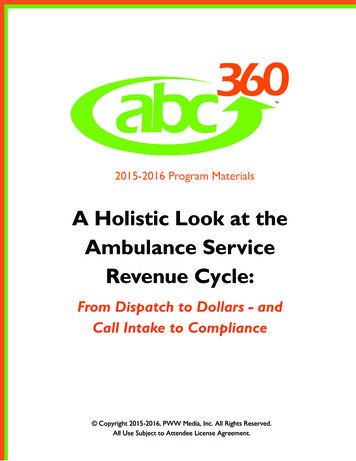
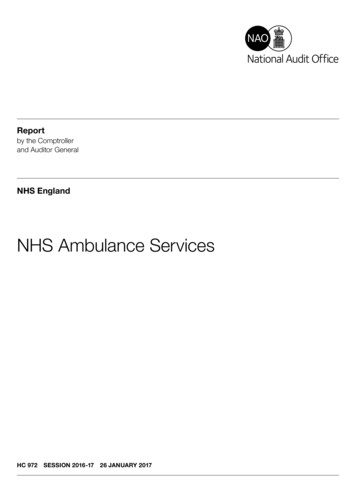
![MOH STANDARDS FOR EMERGENCY AMBULANCE SERVICE (2017) [Updated 21 Nov 2018]](/img/51/emergencyambulancestandards.jpg)
